CCNA – Drag and Drop 2
Here you will find answers to CCNA Drag and Drop Questions – Part 2
Question 1
The left describes OSI layers, while the right provides some terms. Drag the items on the right to the proper locations.
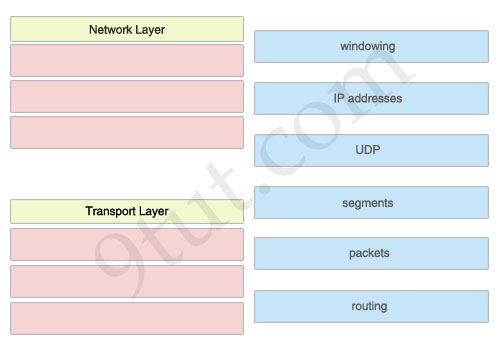
Answer:
Network Layer:
1) IP addresses
2) packets
3) routing
Transport Layer:
1) windowing
2) UDP
3) segments
Question 2
The above describes some categories, while the below provides their corresponding router output lines. Drag the above items to the proper locations.
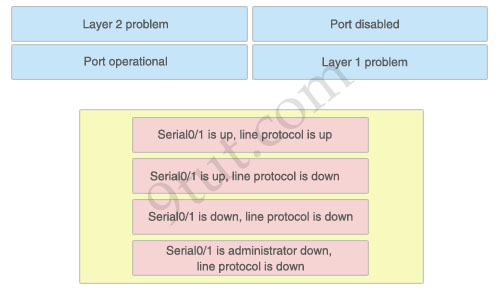
Answer:
1) Port operational: Serial0/1 is up, line protocol is up
2) Layer 2 problem: Serial0/1 is up, line protocol is down
3) Layer 1 problem: Serial0/1 is down, line protocol is down
4) Port disabled: Serial0/1 is administrator down, line protocol is down
Explanation:
A simple way to find out which layer is having problem is to remember this rule: “the first statement is for Layer 1, the last statement is for Layer 2 and if Layer 1 is down then surely Layer 2 will be down too”, so you have to check Layer 1 before checking Layer 2. For example, from the output “Serial0/1 is up, line protocol is down” we know that it is a layer 2 problem because the first statement (Serial0/1 is up) is good while the last statement (line protocol is down) is bad. For the statement “Serial0/1 is down, line protocol is down”, both layers are down so the problem belongs to Layer 1.
There is only one special case with the statement “…. is administrator down, line protocol is down”. In this case, we know that the port is currently disabled and shut down by the administrators.
Question 3
A user is unable to connect to the Internet. Based on the layered approach to troubleshooting and beginning with the lowest layer. Follow the guide and drag the contents to relevant modules.
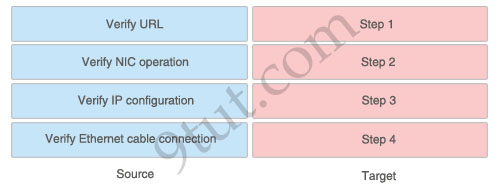
Answer:
1) Verify Ethernet cable connection: Step 1
2) Verify NIC operation: Step 2
3) Verify IP configuration: Step 3
4) Verify URL: Step 4
Explanation:
The question asks us to “begin with the lowest layer” so we have to begin with Layer 1: verify physical connection; in this case an Ethernet cable connection. For your information, “verify Ethernet cable connection” means that we check if the type of connection (crossover, straight-through, rollover…) is correct, the RJ45 headers are plugged in, the signal on the cable is acceptable…
Next we “verify NIC operation”. We do this by simply making a ping to the loopback interface 127.0.0.1. If it works then the NIC card (layer 1,2) and TCP/IP stack (layer 3) are working properly.
Verify IP configuration belongs to layer 3. For example, checking if the IP can be assignable for host, the PC’s IP is in the same network with the gateway…
Verifying the URL by typing in your browser some popular websites like google.com, microsoft.com to assure that the far end server is not down (it sometimes make we think we can’t access to the Internet). We are using a URL so this step belongs to layer 7 of the OSI model.
Question 4
The left describes the types of cables, while the right describes the purposes of the cables. Drag the items on the left to the proper locations. (Not all items can be used).

Answer:
1) straight-through: switch access port to router
2) crossover: switch to switch
3) rollover: PC COM port to switch
Explanation:
To remember which type of cable you should use, follow these tips:
- To connect two serial interfaces of 2 routers we use serial cable
– To specify when we use crossover cable or straight-through cable, we should remember:
Group 1: Router, Host, Server
Group 2: Hub, Switch
One device in group 1 + One device in group 2: use straight-through cable
Two devices in the same group: use crossover cable
For example: we use straight-through cable to connect switch to router, switch to host, hub to host, hub to server… and we use crossover cable to connect switch to switch, switch to hub, router to router, host to host… )
Question 5
The left describes the types of switch ports, while the right describes the features. Drag the options on the right to the proper locations.
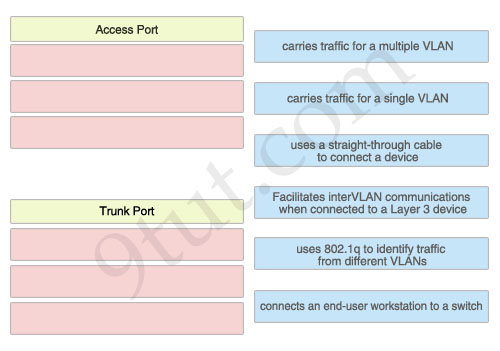
Answer:
Access Port:
- Carries traffic for a single VLAN
– Uses a straight-through cable to connect a device
– Connects an end-user workstation to a switch
Trunk Port:
- Carries traffic for a multiple VLAN
– Uses 802.1q to identify traffic from different VLANs
– Facilitates interVLAN communications when connected to a Layer 3 device
Question 6
The above describes the Spanning-Tree Protocol port states, while the below describes their functions. Drag the above items to the proper locations.
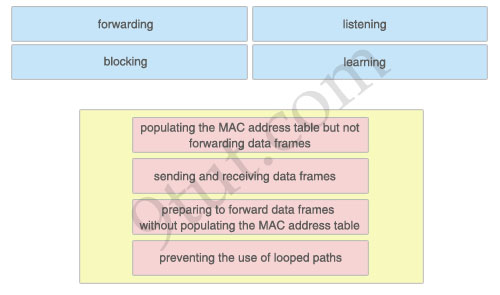
Answer:
- Learning: populating the MAC address table but not forwarding data frames
– Forwarding: sending and receiving data frames
– Listening: preparing to forward data frames without populating the MAC address table
– Blocking: preventing the use of looped paths



Dont know if this is any help for the subnetting….. but for a quick way to find the Networks, hosts and broadcast addresses I use the following method:-
Take a /28 – Well, we are borrwing 4 bits.
Question 1 – What is the lowest network – well, the fourth bit, so 16…Just do the following to find the networks…..
16 + 16 = 32 + 16 = 48 + 16 – Just keep adding the lowest number for the mask and you get the network address.
Given that the first address is 16 we know the first host is 17. The next network address is 32 so we know the broadcast for the 16 network must be next network address – 1 , so 31, and the last usable host address must be next Network address -2.
For a quick way of finding out the amount of host’s and networks for a given mask use the /28 again…..
4 bits on (borrowed), start at 2 and keep doubling for the amount of “ON’s” (4)…..
So you get 2, 4, 8, 16 – but you cant have all 0′s and all 1′s so you have to minus 2 of the final result, so in this case 16 – 2 gives us 14 networks. The same for the 0′s (Hosts) and as it is four as well you will get 14 hosts……..
Since a router and a switch are already identified, the final device box which is on the left side of Main router becomes a router. Agree !!
(When you drop router in the box, additional hosts connected to them for console session automatically for each router)
Since routers and switch are already in place, we can place connection between them. Note that in the picture given above, you will see “Fa interface” and “Serial interface”. These will have to find out by yourself in the exam. Don’t worry “show run” on Main router will tell you the which intefaces Main router has.
Now you can start dropping cable connection. (1) Crossover between Host A and Fa0/1 interface of router. (2) Crossover between Fa interfaces of Main router and router you drop on left side. (3) Serial between two serial interfaces of Main router and router you drop on right side. (4) Straight between switch and router dropped on the right side. Ok?
and router dropped on the right side.
Then it is all about IP calculation based on the subnet mask. Since host A IP address is given, you can calculate Fa0/1 interface of router on the left side. Again, since host C address is given, you can caluculate Fa0/0 interface of router on the right side.
Now, you will have to use “show run” on Main to get the ip address of Fa interface and serial interface. Based on that you can calculate Fa0/0 interface of router on the left side and S0/0 interface of router on the right side.
After that, you will have to start console sessions on each router (except Main) to
(1) assign IP address on the right interfaces (don’t forget “no shut” once after you assign IP address for each interface)
(2) assign privelege password (use the password given in question)
(3) assign console session password (use the password given in question)
(4) assign telnet password (use the passwrd given in question)
Finally, don’t forget “copy run start” on each router.
You don’t need to test out the connections but make sure your configuration are reflected in “show run”. That’s it.
Access port
Carries traffic for a single VLAN
- Uses a straight-through cable to connect a device
- Connects an end-user workstation to a switch
Trunk Port:
- Carries traffic for a multiple VLAN
- Uses 802.1q to identify traffic from different VLANs
- Facilitates interVLAN communications when connected to a Layer 3 device
Trunk Port:
- Carries traffic for a multiple VLAN
- Facilitates interVLAN communications when connected to a Layer 3 device
-Uses 802.1q to identify traffic from different VLANs
can inter change like this are should i follow one order as here menction
please any one help me. my mail id is susmithareddy07@gmail.com
Same question as above… Can I interchange the order of the answers? (except for question 3 of course).
I am saying this because in P4S you can’t! Maybe P4S is wrong…
Hello 9tut .. about Q5 can we change the answers from 1-3-2 to 1-2-3 ?
i mean the Trunk port answer
I would like to ask one thing in Question 1 and Question 5 .
If i answer the drag and drop as follows , the answer is still legal or not ?
Question 1.
Network Layer:
1) packets
2) IP addresses
3) routing
Transport Layer:
1) UDP
2) segments
3) Windowing
Question 5 .
Access Port:
- Carries traffic for a single VLAN
– Uses a straight-through cable to connect a device
– Connects an end-user workstation to a switch
Trunk Port:
– Facilitates interVLAN communications when connected to a Layer 3 device
– Uses 802.1q to identify traffic from different VLANs
- Carries traffic for a multiple VLAN
In Mashi or ACME drap and drops , It indicates a false answer if i didn’t drag and drop like they described in their answer.
hello every one i will enter exam ccna tmorrwo and i wanna know
how many ques. in this exam?
in the ques drag drop r order to answer important or not?
i am finish study 9tut and test inside r any thing another it?
any one plz tell me notes in this exam plzzzzzzzzzzzzzzzzzzzzzzz
only thing make me confused in Question 5,
i know the three & three right options for answer of this qstn,
but is it realy need to mentain the sequence ?
please do help somebody……
Thanks
@9tut..please comment on the sequence of the answers, personally i don’t think it matters but i would just like confirmation
@all: We don’t need to remember the sequence of the answers!
Aalhamdulillah,
Hi Everyone,
I M Just here to say thank u so much to 9tut and all who post there valuable comment on this website.
I took mah Exm on 4th Feb’11 and I hv pass d Exm with scoring 923.
All d best to u all who is gonna be appeare dr exm.
Hi guys,
i have a question from P4S
Refer to the Exibit,what can be determind from the output,
Router#show ip arp
Protocol Address Age () Hardware Address Type Interface
Internet 192.168.1.1 – Ca00.17d0 ARPA Fasteithernet0/0
Internet 192.168.3.1 – Ca00.17d0 ARPA Fasteithernet0/0
Internet 192.168.1.2 0 Ca00.17d0 ARPA Fasteithernet0/0
A:192.168.1.2 is local to the router
B:192.168.3.1 is local to the router
C:192.168.1.2 will age out in less then one minute
D:192.168.3.1 has aged out and is marked for deletion.
In Dumps the answer is B, But i am totally confused how from this out put we come to know
that B:192.168.3.1 is local to the router
from this out put how we can get understand.
to Massod:
actually the 192.168.1.1 and 192.168.3.1 marked (-) are the local ip addresses assigned for the local router interfaces.
Hallo guys, can any out help me i am a bit confused with Q num, 1, i wpould like to kw if the above can come in any order?. dat is to say for the netwk layer, an one start by putting ip address then any other th follow.
@ nell i suppose u can put it in any order u want as long as u drag the good answers.
hi Every body ,my Exam after 2 days ,i study well but am afraid too can any body send me the last dumps ,i will be thankfull
hassan_salamah@hotmail.com
big like! – thanks .
Can someone kindly send me the latest dumps for CCNA 802 exam to cts1234586@hotmail.com
Many Thanks
Q1…I think answer of Q1 above wrong to the proper locations. Please, help me…!!!
Q5..? I don’t understand…location..?
hello all,
could some one email me latest dumps i will be sitting in two weeks time.my address is mkisochi@yahoo.com.
kind regards
Hi all,
Can anyone send me the latest dumps especially sims . my address is lekhak123@hotmail.com
Hi all,
Can anyone one sende me the latest dumps pls, email: s_evil_5@hotmail.com
Thanks,
Hi, Appreciate if someone could send me the latest dumps at treepanel.ken@hotmail.com , i plan to take the exams at the end of sep.
Thanks.
Guys, u’re all a big help….I will be taking my exams in 4 days time!! with ur tips I’m feeling my confidence back..any one,help with latest dumps, ibukun_nelson78@yahoo.in tanx all
Hi Guys, Good day!!! I will be taking exam next month please send me the latest dumps at melmaj_may2183@yahoo.com ….thank you:)
hi all, for Q1 must the items dropped in the categories be in specifc order , as given in the answers or can as long as they belong to the correct categories?
When subnetting base on the number of hosts, find add 1 to the number hosts, add 1, when subnetting based on the number of networks, subtract 1 for the number. Follow this rule and you will be fine.
E.G: Given 192.168.1.0, add 5 hosts for a class c address
128 64 32 16 8 4 2 1
1 1 1 1 1 0 0 0 = we only need 2 bits but we add one more, thus our increment is
8 and our subnet mask is /29
192.168.1.0
8
16
…………… etc
we only need five hosts, so we can achieve this in the fist subnet:
192.168.1.0 – 192.168.1.7
Notice that we can’t use the first and last number in the range, as the 192.168.1.0 is our network and 192.168.1.7 is our broadcast address for the first subnet
So our useful range of addresses is 192.168.1.1 – 192.168.1.6
Hope this helps someone who has issues finding the hosts.
As Jamie would say, practice and you will be fine
CCIE #XXXX September 29th, 2011 When subnetting based on the number of hosts, add 1 to the number hosts required, and when subnetting based on the number of networks, subtract 1 for the number. Follow this rule and you will be fine.
Here is an example when hosts are asked for on the test question:
E.G: Given 192.168.1.0, add 5 hosts for a class c address
128 64 32 16 8 4 2 1
1 1 1 1 1 0 0 0 = we only need 2 bits but we add one more, thus our increment is
8 and our subnet mask is /29
192.168.1.0
8
16
…………… etc
we only need five hosts, so we can achieve this in the fist subnet:
192.168.1.0 – 192.168.1.7
Notice that we can’t use the first and last number in the range, as the 192.168.1.0 is our network and 192.168.1.7 is our broadcast address for the first subnet
So our useful range of addresses is 192.168.1.1 – 192.168.1.6
Hope this helps someone who has issues finding the hosts.
As Jamie would say, practice and you will be fine
q1 was in my ccna exam (29/9/2011)..
@9tut.am in support of disket. for acme, when you answer Q1 in an other a little different from theirs, u’ll be marked wrong. just like how disket made it clear. but i don’t think it should be so.so far as it matches the category it should be right.
i want to find out if it is so in the final exam or it can follow any order.
hi :
in the drag and drop QUS its must be importen..
that it will be in one sequence like QUS 5….access port and trunk port…..
or put the opstion in any step?tomorrow is my ccna paper
replay me dilightkhan@yahoo.com
plz send me the latest dump u have passed on my email @ : dreamm_life@hotmail.com
I was serioulsy at DefCon 5 until I saw this post.
can someone please share what DnD you had in real exam…..
q1,q3 are there for my todays xam
Hi 9tut… Hi Guys! Can you please help me… I will take exam this Feb. Please send me latest dump so that I will have an idea for the exam.. rico.blake@ymail.com
Thanks Guys!
@9 is order any issue to loose marks looking at Q1 and Q5 even if you place the correct answer for each category because in dump simulations l was being marked wrong.
I NEED THW LINK 4 THW Ltwat dump pleaz …thx
@ t-one I think you should mark in such a way like 1st one at the right hand side will be dragged to the left ..It should be in order from top to bottom.. I hope yhis will help.!!!
Q1, Q3 in exam.
Hey guys….this site is terrific. Going to take the exam in the next few weeks. Can someone please send me the latest dump…wickedclown0813@gmail.com
Hi Guys,
Today is my great day,
thanks God, thanks 9tut help me to reach 986 of 1000.
today, I got question 1 of this topic!
Good lock to everyone,
Slavi
Q1,2,4 were in my exam today…
Hi all, I am taking CCNA 640-802 exam first time on 30/05/2012. Could anyone please send me latest dumps which are valid for UK? My e-mail address is puneet_gill84@yahoo.co.uk. Many thanks.
I PASSED CCNA EXAM TODAY THANKS TO ALL MIGHTY ALLAH
960/1000
I passed my ccna exam today Praise be to God! Thank you Jesus! and thanks to 9TUT for the tutorials and explanations, great site and thanks to xallax for your explanations to questions and thanks to http://www.examcollection.com for the dumps. Pls guys lets donate and help to keep this site up!
48 ques for exams including 3 simulation, I had EIGRP, Acesslist2 and VTP . Make sure you practice the simulation, use packet tracer or gns3. Best wishes to all!
Hey, looks like everybody wants the latest dumps
here it is more than enough to pass 100%
go ahead download it from
http://www.examcollection.com/cisco/Cisco.Acme.640-802.v2012-04-18.by.Collisio.487q.vce.file.html
Hey, looks like everybody wants the latest dumps
here it is more than enough to pass 100%
go ahead download it from
http://www.examcollection.com/cisco/Cisco.Acme.640-802.v2012-04-18.by.Collisio.487q.vce.file.html
can any one send me the latest CCNA dumps to my mail id which stated below coz I will do the exam on september my sopprusbarbosa@hotmail.com